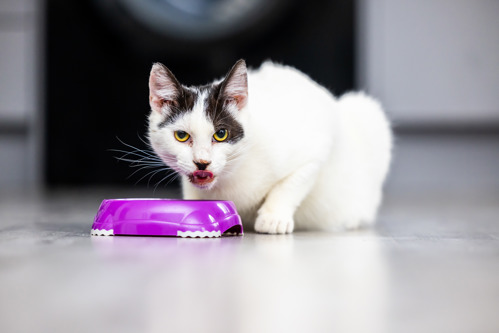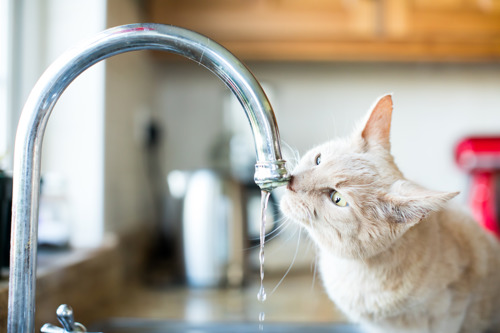Giving your cat milk may not be safe
When you see cats in cartoons or movies, they are often shown happily lapping up a bowl of milk. But is milk good for cats? The surprising truth is that most cats are actually lactose intolerant. This means that milk and other dairy products can cause digestive issues for your cat.
What is lactose intolerance?
Lactose intolerance in cats is like that in humans. Lactose is the sugar found in milk and other dairy products such as cheese. It requires an enzyme called lactase to be properly digested. Kittens produce lots of lactase because they need it to digest their mother's milk. But as cats grow and transition to solid food, their bodies produce less lactase. This means that many adult cats lose the ability to properly digest lactose. Many animals, including dogs, can suffer from lactose intolerance.

What happens if a cat drinks milk?
If a lactose-intolerant cat drinks milk or eats other dairy products, the lactose can’t be properly broken down in their digestive system. Instead of being absorbed, the lactose moves into the large intestine, where it ferments. This fermentation process can lead to a range of unpleasant symptoms. These occur about eight to 12 hours after the cat first eats the dairy product.
Lactose intolerance symptoms in cats
How do you know if your cat is lactose intolerant? If your cat has eaten dairy, look out for these symptoms of lactose intolerance in cats:
-
diarrhoea. One of the most common signs of lactose intolerance in cats, which can lead to dehydration. Diarrhoea can be tricky to spot if your cat mainly goes to the toilet outside
-
gurgling stomach noises
-
a bloated tummy
-
farting more than usual. There is often a buildup of gas as the lactose ferments in the gut
-
going outside more regularly than usual. This could be a sign that your cat is going to the toilet more often due to diarrhoea
-
a dirty, smelly bottom
-
excessively cleaning their bottom
-
lethargic/low in energy
These symptoms can be uncomfortable for your cat. In severe cases, your cat may need veterinary attention.
Are all cats lactose intolerant?
There are conflicting estimates for the number of cats affected by lactose intolerance. But it does seem that most adult cats are lactose intolerant. Any cat could be lactose intolerant, as the condition is not dependent on their breed or genetics.
At what age do cats become lactose intolerant?
Newborn kittens produce enough lactase to digest their mother's milk. When they are three to four weeks old, they start to wean onto solid food. By the time they are six to eight weeks old they should be fully weaned onto solid food. At this age their body may start to produce less lactase, making them lactose intolerant.
How to treat lactose intolerance in cats
There is no treatment to stop cats being lactose intolerant. Instead, you should avoid feeding your cat dairy products such as milk and cheese.
If your cat does get diarrhoea as a result of eating dairy, feed them small, bland, frequent meals. This could include boiled chicken or white fish. Make sure any bones or skin are removed. You can also buy cat food specifically for cats with an upset stomach. Ask your vet which one they recommend for your cat. Don’t feed your cat anything rich or fatty as this could upset their stomach more. Definitely don’t feed them anything else with lactose in. If your cat refuses to eat, speak to your vet for advice.
Once your cat is passing solid poo, you can start to gradually reintroduce their normal diet over a few days. Find out more about digestive problems in cats.
Is it ok for cats to drink milk?

The best thing for adult cats to drink is water. Water is essential for helping to maintain kidney function and keep their organs in good working order. They don’t need anything else to drink to keep them healthy. Make sure your cat has access to plain, fresh water at all times. They should be able to drink as much as they want. Find out more about cats and drinking.
It is best to avoid giving your cat milk. If your cat is lactose intolerant, milk could make them unwell. Even if you think your cat may not be lactose intolerant, there is still a risk of milk making your cat unwell. Dairy products have no dietary benefit for cats and can cause them to put on weight. Find out more about cat obesity.
Can I give my cat lactose-free milk?
Lactose-free milk or special cat milk which is made for cats does not contain lactose and won’t make your lactose-intolerant cat unwell. But these products contain a lot of calories which could cause your cat to put on weight. They also don’t contain the nutrients your cat needs to stay healthy. It is best to avoid giving your cat any type of milk. Water is all they need to drink to stay happy and healthy.
Can kittens drink milk?
Newborn kittens should drink their mother’s milk. This is different from cow’s milk. It contains antibodies that will protect kittens from disease. If kittens are not able to feed from their mother, they can be hand-fed with a substitute kitten milk. This is specially made for kittens and contains all the nutrients they need. Speak to your vet for advice if you are caring for newborn kittens without a mother. Once kittens are six to eight weeks old, they should be fully weaned onto solid food. They then only need to drink water, not milk. Find out more about caring for kittens.
If cats are lactose intolerant, why do they like milk?
Given that most cats are lactose intolerant, why do they seem to enjoy milk so much? The answer lies in the fat content. Milk, especially whole milk, contains fats that cats find tasty and appealing. This attraction to the fat content can make them want to drink milk even if it upsets their stomach later.
Why did we used to give cats milk?
The myth that cats should drink milk likely originates from the days when cats were domesticated on farms, where fresh milk was readily available. Cats may have drunk milk out of convenience, especially if they had no other sources of food. Also, kittens drink milk from their mothers, reinforcing the idea that milk is a natural part of a cat’s diet. But the milk kittens drink is not the same as cow's milk, which is higher in lactose and more difficult for adult cats to digest.
What are the most common food intolerances in cats?
Lactose intolerance is the most common food intolerance in cats. Some cats are also intolerant to some sources of protein, such as fish or beef. If you are concerned about your cat’s diet, speak to your vet for advice.
Find out more about feeding cats.



